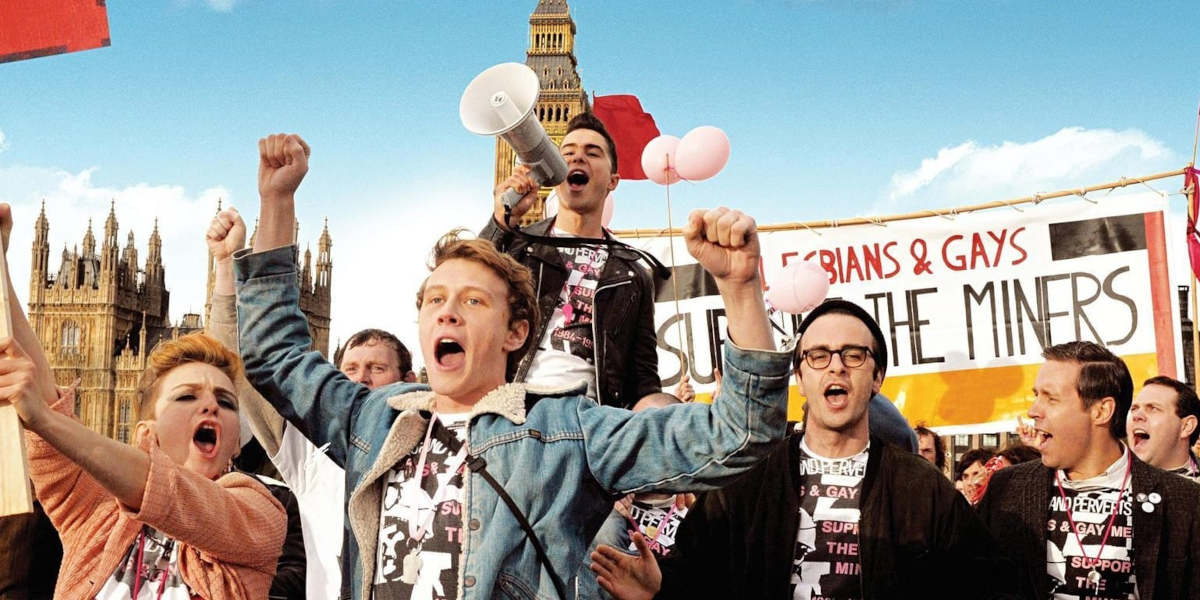The 2014 film Pride is based on the true story of Lesbians and Gays Support the Miners (LGSM), set up at the start of the miners’ strike in 1984 to raise funds and supplies for the National Union of Mineworkers (NUM).
In the film, LGSM reaches out to a small branch in Onllwyn, South Wales, after the NUM declines its support through fear of negative publicity. Despite some initial hesitancy, Onllwyn invites LGSM to visit, and its ongoing support is eventually embraced.
In 1985, despite the failure of the strike, miners join the Lesbian and Gay Pride rally in London and the NUM block vote helps establish equal rights for gays and lesbians as Labour Party policy. Deftly handled by writer Stephen Beresford, this little known history makes for a funny, warm and impressively political film.
On the surface, Pride seems to encourage solidarity across groups defined by identity politics – the bête noire of many Marxists. Digging deeper, however, Beresford instead shows ostensibly disparate movements mirroring each other. Staid miner Dai is the ideological mate to restless iconoclast Mark; women refuse supporting roles and assert their own politics; queers – and homophobes – are to be found in cities and valleys alike. Pride is about making community in the pursuit of justice.
Pride is about making community in the pursuit of justice
The film is not flawless. The packed, intertwining plotlines inevitably sell a few ensemble members short, though none verge into caricature. Strong acting across the board ensures that even bit parts feel authentic, and helps cover cracks in occasionally suspect regional accents.
The ‘feelgood’ tone of the film has caused some critics to bristle, and perhaps rightly. Pride arguably dwells too long on uplifting sequences, and skips too lightly over scenes that could pack more punch. A few poignant moments, and one or two troubling interactions, feel cut short. Given the failure of the strike, it might seem perverse for cinemagoers to exit smiling.
I disagree. The power of Pride lies in its embrace of humour. Yet themes of family rejection, homelessness, AIDS deaths and panics, homophobia and living on the bread line are all present and accounted for. By revealing without dwelling on each, the film feels earnest without dissolving into mawkishness.
Unlike the similarly bittersweet and music-laden Billy Elliot, Beresford’s script celebrates group solidarity even in the face of failure, rather than individual triumph over adversary. This is Pride’s enduring strength. Though the strike breaks, the gay rights movement is strengthened through the LGSM-NUM alliance.
In the film’s closing scene, the Pride ’85 organisers tell LGSM to take down their banners, as the event is now intended as a celebration, not a protest. Overwhelming NUM numbers force a change of heart. Yet Pride marchers hear the same refrain today. It continues to ring hollow, but floats for Selfridges, the Met and LGBTory drown out our placards.
In this context, Pride is an indictment of many contemporary gay rights campaigners, whose failure to fight austerity policies that disproportionately affect LGBT populations has broader repercussions. It is also a timely reminder to a fractured left that solidarity, found even in the least likely of places, matters a great deal – and, just maybe, that we can smile as we build it.










